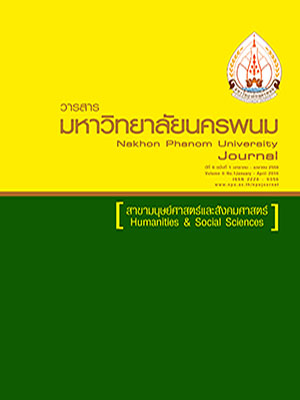การพัฒนารูปแบบการจัดการความรู้ โดยบูรณาการแนวคิดการรับรู้ความสามารถตนเองและการกำกับตนเอง เพื่อพัฒนาความสามารถด้านการจัดการเรียนการสอนของครู วิทยาลัยนาหว้า มหาวิทยาลัยนครพนม
Main Article Content
Abstract
การวิจัยครั้งนี้มีวัตถุประสงค์เพื่อ 1) ศึกษาสภาพการจัดการความรู้การจัดการเรียนการสอนของครูวิทยาลัยนาหว้า ก่อนพัฒนารูปแบบการจัดการความรู้ 2) พัฒนารูปแบบการจัดการความรู้ เพื่อพัฒนาความสามารถด้านการจัดการเรียนการสอนของครูวิทยาลัยนาหว้า มหาวิทยาลัยนครพนม โดยบูรณาการแนวคิดการรับรู้ความสามารถตนเองและการกำกับตนเองและ 3) ศึกษาผลการใช้รูปแบบการจัดการความรู้ที่พัฒนาขึ้นดำเนินการวิจัยโดยใช้กระบวนการวิจัยและพัฒนา กลุ่มตัวอย่างเป็นครูวิทยาลัยนาหว้า ที่ปฏิบัติการสอนในภาคเรียนที่ 2/2557 จำนวน 22 คน เครื่องมือที่ใช้ในการวิจัย แบ่งเป็น 5 ประเภท ได้แก่ 1) แบบทดสอบ 2) แบบประเมิน 3) แบบวัด4) แบบสอบถาม และ 5) แบบสัมภาษณ์ สถิติที่ใช้ในการวิเคราะห์ข้อมูล ได้แก่ ค่าเฉลี่ย ส่วนเบี่ยงเบนมาตรฐาน และการทดสอบที(t-test)
ผลการวิจัยพบว่า 1) ครู วิทยาลัยนาหว้า มีความรู้ ความเข้าใจเกี่ยวกับการจัดการความรู้เพียงขั้นตอนการแลกเปลี่ยนเรียนรู้ยังไม่เข้าใจในทุกขั้นตอนของการกระบวนการจัดการความรู้อย่างละเอียด จึงใช้เฉพาะการประชุมในการจัดการความรู้ภายในวิทยาลัยและสภาพการจัดการเรียนการสอนของครู อยู่ในระดับปานกลาง (x = 3.08) มีความต้องการพัฒนาความสามารถด้านการจัดการเรียนการสอนในระดับมาก (x = 3.91) 2) รูปแบบการจัดการความรู้ที่พัฒนาขึ้นมีองค์ประกอบ 5 ประการ คือ (1) หลักการ (2) จุดมุ่งหมาย(3) เนื้อหา (4) กระบวนการ และ (5) การวัดและประเมินผล 3) ผลการใช้รูปแบบที่พัฒนาขึ้นพบว่า 3.1) ครูมีความสามารถในการจัดการเรียนการสอนที่เน้นผู้เรียนเป็นสำคัญ การวัดและประเมินผลที่เน้นผู้เรียนเป็นสำคัญ และการวิจัยปฏิบัติการในชั้นเรียนหลังการพัฒนาสูงกว่าก่อนการพัฒนา อย่างมีนัยสำคัญทางสถิติที่ระดับ .01 3.2) ครูมีการรับรู้ความสามารถตนเองและการกำกับตนเอง หลังการพัฒนาสูงกว่าก่อนการพัฒนาอย่างมีนัยสำคัญทางสถิติที่ระดับ .01
This study aimed to 1) investigate the state of knowledge and instructional management of teachers in Nawa College before developing a knowledge management model; 2) develop a knowledge management model to develop instructional ability of teachers in Nawa College, Nakhon Phanom University through the integration of self-efficacy and self-regulation concepts; 3) examine the implementation results of the developed knowledge management model. Research methodology used was the research and development process. The samples were 22 teachers at Nawa College who taught in the second semester of the academic year B.E. 2557 (2014). The research instruments employed in this study could be divided into 5 types, namely 1) test, 2) evaluation form, 3) measurement form, 4) questionnaire and 5) interview form. Statistics used in data analysis were mean, standard deviation and t-test.
The findings were as follows : 1) teachers in Nawa College had only an understanding in knowledge sharing process but did not have a throughout understanding in every stage of knowledge management process, thus it was only used in the college's internal meeting for knowledge management. The state of teachers' instructional management was at a moderate level (x = 3.08) and their need to develop instructional ability was at a high level (x = 3.91); 2) the developed knowledge management model comprised 5 components, namely(1) principles; (2) objectives; (3) content; (4) process and (5) assessment and evaluation; 3) the implementation
results of the developed model were as follows : 3.1) teachers had higher student-centered instructional ability, student-centered assessment and evaluation ability and classroom action research ability after the development than prior to the development at a statistically significant level of .01; 3.2) teachers had higher self-efficacy and self-regulation after the development than before the development at a statistically significant level of .01.


